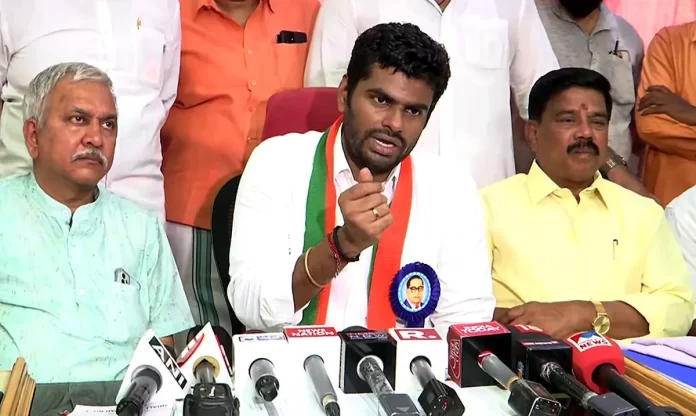New Delhi: The sudden resignation of K. Annamalai as Tamil Nadu BJP President has unleashed a new wave of political conjecture and realignment in the southern state. Although Annamalai explained it as a routine organizational shake-up, political analysts are of the view that this was a part of a much bigger strategy thoughtfully developed at the top echelons of the Bharatiya Janata Party. The timing of his resignation, just days after senior AIADMK leader Edappadi K. Palaniswami’s prolonged meetings with Union Home Minister Amit Shah in Delhi, only strengthens this hypothesis.

But under the political chessboard, there is a greater issue—one transcending personnel changes or party realignments. It is the growing shrill and systemic anti-national discourse that is being produced by the DMK-led Tamil Nadu state government, which is gradually transforming the state into a center of constitutional disobedience and ideological confrontation with the Centre.
One stark example of this was the initiative of the Tamil Nadu government to side-step the National Eligibility cum Entrance Test (NEET) by enacting a state-legislation seeking exemption for its students from the central test. Although the bill was cleared with great ado in the state legislature, it was later thwarted by the President of India, making it worthless. But the very attempt to question a core law—which provides uniform standards of medical education in the country—is a dangerous precedent.
This is not about autonomy in education. This is about weakening national standards and planting seeds of separatist tendencies in the name of regional pride. When elected members question the authority of the Constitution itself, it becomes more than a political difference—it becomes an act of institutional rebellion.
The DMK government’s antagonism toward Hindi, Sanskrit, and wider pan-Indian cultural icons is not new. But whereas once it was confined to rhetoric, now it has permeated administrative policy and public discourse. From resisting central schemes merely because they are Delhi-based, to advancing a sectarian Dravidian ideology that turns the South against the rest of India, the rhetoric has hardened and become more polarizing.
Take the repeated taunts of Sanatan Dharma or open court fights against national festivals such as Hindi Diwas or Ayodhya Ram Mandir functions. These are not merely cultural differences—they express an ideological contempt for India’s pluralistic unity. The regime’s endorsement, implicit or explicit, of voices that ridicule religious feelings of a majority, serves only to fan these flames.
The DMK administration and its ecosystem have revealed a trend: if the court goes against them, the judiciary is “politicized”; if the Centre does not pass their bills, it’s “fascism.” Such perilous narrative-weaving erodes democratic institutions. In addition, the government’s inaction or backing of extremist groups that deride Hindu customs has gravely disenchanted a major section of people.
Of late, the row over temple administration, under which the state tries to exert disproportionate control over religious institutions, has been uniformly denounced. Temples are targeted in the guise of reform, while the functioning of other religious institutions is singularly bereft of similar criticism. Such selective activism is indicative of an agenda quite far removed from secular government.
One of these is the uncensored escalation of religious conversions in Tamil Nadu among SC/ST groups and financially disadvantaged segments of society. Aggressive missionary strategies have gone largely unmonitored by the state government, casting doubts on manipulation of populations. Hindu traditions have been undermined and replaced by threat and incentives in most rural societies—shifting not only religious affiliations but also undermining local social cohesiveness.
Whereas democratic India gives space to religious freedom, mass conversions carried out under the pressure of or by fraud is against both the tenets of secularism and the dignity of individuals. Government’s inaction and sometimes taking cover of perpetrators has been guilty of cultural annihilation.
Under this context, the strategy of BJP can be seen more evidently. Annamalai was a young leader who spoke very articulately with a clean image brought the BJP to Tamil Nadu’s villages. His aggressive posture might not always have suited coalition politics, but he made the BJP heard in a state where it was summarily rejected earlier. His words, which recall the lucidity and confidence of leaders such as Vivek Ramaswamy in the United States, activated a new part of society—young people and first-time voters in particular.
But the short-term political imperative requires a different strategy. With Lok Sabha polls on the horizon and 2026 assembly polls in the pipeline, the BJP cannot risk anti-DMK vote fragmentation. The AIADMK, with all its internal cracks, still has a significant vote base. To take on the entrenched DMK, an united opposition is essential—and that means taking in factions led by Palaniswami, Sasikala, TTV Dhinakaran, and even OPS.
By retiring briefly, Annamalai could have been making a tactical retreat, but his part in the BJP’s overall Tamil Nadu plan is not by any means done. There’s widespread speculation that he’ll be inducted into the Rajya Sabha and then the Union Cabinet—giving him a national profile with a southern constituency.
What Tamil Nadu is going through is not simply a normal political churn—it is a civilizational moment. While Dravidian parties stretch the limits of federalism towards soft separatism, it is necessary for national parties and institutions to balance it out. While regional pride is an understandable sentiment, it cannot turn into regional arrogance that spurns the nation’s shared heritage and constitutional unity.
The road to 2026 may be long, but the groundwork is being laid now. Tamil Nadu, long seen as politically isolated from the national mainstream, may be inching closer to a political awakening. And in this journey, the role of voices like Annamalai’s—assertive, unapologetic, and rooted—will remain vital.
The post Exit Annamalai, DMK’s Anti-National Turn and BJP’s Counter Strategy appeared first on Global Governance News- Asia's First Bilingual News portal for Global News and Updates.




